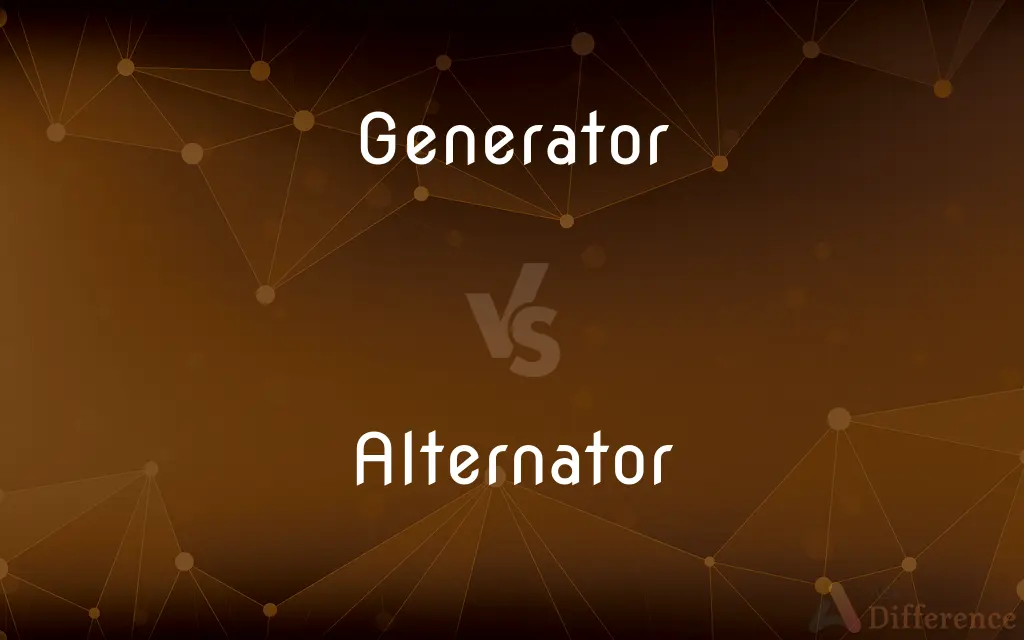Generator vs. Alternator — What's the Difference?
Edited by Tayyaba Rehman — By Fiza Rafique — Updated on April 22, 2024
Generators produce direct current using commutators, ideal for stable, low-output applications; alternators generate alternating current and are more efficient, mainly used in automobiles.

Difference Between Generator and Alternator
Table of Contents
ADVERTISEMENT
Key Differences
Generators utilize a commutator to produce direct current, suitable for applications requiring stable voltage and current. Whereas alternators, lacking a commutator, generate alternating current which is then rectified for use in systems like automotive electrical systems.
Generators are often seen in older or specialized technology due to their ability to produce a steady direct current output, whereas alternators are favored in modern vehicles for their efficiency and ability to charge batteries quickly even at low engine speeds.
The design of a generator allows it to operate at low speeds but with less efficiency compared to alternators, which are optimized to function effectively across a wider range of speeds.
Generators are typically larger and heavier than alternators, which are more compact and lighter, making them easier to integrate into modern automotive designs.
Despite the historical dominance of generators, the shift towards alternators in vehicles highlights the general trend towards systems requiring more robust and efficient power generation capabilities.
ADVERTISEMENT
Comparison Chart
Current Type
Direct Current (DC)
Alternating Current (AC)
Component
Uses a commutator
Does not use a commutator
Efficiency
Less efficient
More efficient
Weight and Size
Generally larger and heavier
Smaller and lighter
Application
Older technology, stable output
Modern vehicles, efficient output
Compare with Definitions
Generator
Often used in settings where stable, continuous power is needed.
Hospitals often have backup generators to ensure power during outages.
Alternator
Commonly used in automotive applications.
Alternators are essential for handling modern automobiles' electrical demands.
Generator
Typically involves heavier and bulkier construction.
Industrial generators are robust and designed for prolonged use.
Alternator
An electrical generator that converts mechanical energy to electrical energy in the form of alternating current.
Most modern cars are equipped with an alternator.
Generator
Operates efficiently at constant low speeds.
Wind turbines use a type of generator to produce electricity.
Alternator
Designed to work efficiently across various engine speeds.
An alternator can charge the car's battery quickly even at idle.
Generator
Found in many older or specialized applications.
Submarine and spacecraft systems frequently utilize generators.
Alternator
Lighter and more compact than traditional generators.
The compact design of alternators makes them ideal for small engine compartments.
Generator
A machine that converts mechanical energy into electrical energy via direct current.
Many remote cabins use a diesel generator for electricity.
Alternator
Does not use a commutator, which simplifies construction.
The simplicity of alternators reduces maintenance issues over time.
Generator
One that generates, especially a machine that converts mechanical energy into electrical energy.
Alternator
An alternator is an electrical generator that converts mechanical energy to electrical energy in the form of alternating current. For reasons of cost and simplicity, most alternators use a rotating magnetic field with a stationary armature.
Generator
An apparatus that generates vapor or gas.
Alternator
An electric generator that produces alternating current.
Generator
A circuit that generates a specified waveform.
Alternator
(electrical engineering) An electric generator which produces alternating current through mechanical means.
Generator
(Mathematics) See generatrix.
Alternator
An electric generator or dynamo for producing alternating currents.
Generator
(Computers) A program that produces specific programs from the definition of an operation.
Alternator
An old term for an electric generator that produces alternating current (especially in automobiles)
Generator
One who, or that which, generates, begets, causes, or produces.
Generator
(chemistry) An apparatus in which vapour or gas is formed from a liquid or solid by means of heat or chemical process, as a steam boiler, gas retort etc.
Generator
(music) The principal sound or sounds by which others are produced; the fundamental note or root of the common chord; -- see also generating tone.
Generator
(mathematics) An element of a group that is used in the presentation of the group: one of the elements from which the others can be inferred with the given relators.
Generator
(geometry) One of the lines of a ruled surface; more generally, an element of some family of linear spaces.
Generator
(programming) A subordinate piece of code which, given some initial parameters, will generate multiple output values on request.
Generator
A piece of apparatus, equipment, etc, to convert or change energy from one form to another.
Generator
Especially, a machine that converts mechanical energy into electrical energy.
Generator
One who, or that which, generates, begets, causes, or produces.
Generator
An apparatus in which vapor or gas is formed from a liquid or solid by means of heat or chemical process, as a steam boiler, gas retort, or vessel for generating carbonic acid gas, etc.
Generator
The principal sound or sounds by which others are produced; the fundamental note or root of the common chord; - called also generating tone.
Generator
Any machine that transforms mechanical into electrical energy; a dynamo.
Generator
A mathematical entity which, when subjected to an operation, yields another mathematical entity; also, a generatrix.
Generator
An apparatus that produces a vapor or gas
Generator
Engine that converts mechanical energy into electrical energy by electromagnetic induction
Generator
Someone who originates or causes or initiates something;
He was the generator of several complaints
Generator
An electronic device for producing a signal voltage
Common Curiosities
What is a generator?
A generator is a device that converts mechanical energy into electrical energy, typically providing direct current for various applications.
What is an alternator?
An alternator is a type of generator that produces alternating current by converting mechanical energy into electrical energy, mainly used in vehicles.
Where are generators typically used?
Generators are used in applications requiring stable, uninterrupted power supply, such as in medical facilities and remote areas.
How does a generator differ from an alternator in terms of construction?
A generator uses a commutator to produce direct current, whereas an alternator uses an alternating current system that is rectified to direct current if needed.
Why are alternators more efficient than generators?
Alternators are more efficient due to their ability to produce electricity across a wider range of engine speeds and their simpler construction without a commutator.
What type of current does a generator produce?
Generators typically produce direct current (DC).
Which is heavier, a generator or an alternator?
Generators are generally heavier and bulkier than alternators.
Can a generator be used in a car instead of an alternator?
While technically possible, using a generator in a modern car is inefficient and impractical compared to using an alternator.
What type of current does an alternator produce?
Alternators produce alternating current (AC), which is often converted to direct current in automotive applications.
Where are alternators typically used?
Alternators are primarily used in automotive applications to charge batteries and power electrical demands.
Share Your Discovery

Previous Comparison
Ontology vs. Epistemology
Next Comparison
EFT vs. ACHAuthor Spotlight
Written by
Fiza RafiqueFiza Rafique is a skilled content writer at AskDifference.com, where she meticulously refines and enhances written pieces. Drawing from her vast editorial expertise, Fiza ensures clarity, accuracy, and precision in every article. Passionate about language, she continually seeks to elevate the quality of content for readers worldwide.
Edited by
Tayyaba RehmanTayyaba Rehman is a distinguished writer, currently serving as a primary contributor to askdifference.com. As a researcher in semantics and etymology, Tayyaba's passion for the complexity of languages and their distinctions has found a perfect home on the platform. Tayyaba delves into the intricacies of language, distinguishing between commonly confused words and phrases, thereby providing clarity for readers worldwide.
















































